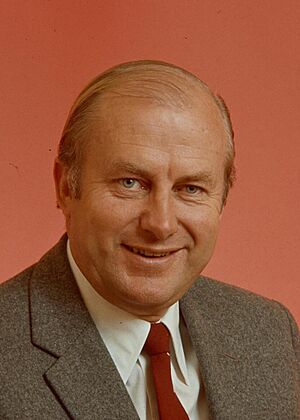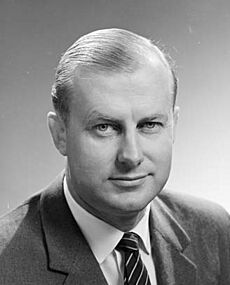Peter Nixon facts for kids
Quick facts for kids
Peter Nixon
|
|
|---|---|

Nixon in 1974
|
|
| Minister for Primary Industry | |
| In office 27 September 1979 – 11 March 1983 |
|
| Prime Minister | Malcolm Fraser |
| Preceded by | Ian Sinclair |
| Succeeded by | John Kerin |
| Minister for Shipping and Transport | |
| In office 11 November 1975 – 8 December 1979 |
|
| Prime Minister | Malcolm Fraser |
| Preceded by | Charles Jones |
| Succeeded by | Ralph Hunt |
| In office 5 February 1971 – 5 December 1972 |
|
| Prime Minister | John Gorton William McMahon |
| Preceded by | Charles Jones |
| Succeeded by | Ralph Hunt |
| Postmaster-General | |
| In office 11 November 1975 – 22 December 1975 |
|
| Prime Minister | Malcolm Fraser |
| Preceded by | Reg Bishop |
| Succeeded by | Victor Garland |
| Minister for the Interior | |
| In office 16 October 1967 – 5 February 1971 |
|
| Prime Minister | Harold Holt John McEwen John Gorton |
| Preceded by | Doug Anthony |
| Succeeded by | Ralph Hunt |
| Member of the Australian Parliament for Gippsland |
|
| In office 9 December 1961 – 4 February 1983 |
|
| Preceded by | George Bowden |
| Succeeded by | Peter McGauran |
| Personal details | |
| Born | 22 March 1928 Orbost, Victoria, Australia |
| Died | 1 May 2025 (aged 97) Melbourne, Victoria, Australia |
| Political party | Country / NCP |
| Spouse |
Sally Dahlsen
(m. 1954–2013) |
| Children | 3 |
| Education | Wesley College, Melbourne |
| Occupation | Grazier, company director |
Peter James Nixon (22 March 1928 – 1 May 2025) was an Australian politician and businessman. He was a member of the Australian House of Representatives from 1961 to 1983. He represented the area of Gippsland for the National Country Party. During his time in government, he held several important roles. These included Minister for the Interior, Minister for Shipping and Transport, Postmaster-General, and Minister for Primary Industry.
Contents
Early Life and Farming
Peter Nixon was born on March 22, 1928, in Orbost, Victoria. He grew up on his family's farm near Orbost. In 1939, during the big Black Friday bushfires, his family had to find safety in the Snowy River.
He went to Wesley College, Melbourne. When he was 18, he hurt his left hip badly while playing Australian rules football. He had to stay in the hospital for eight months. To pass the time, he read books and played chess.
After he got better, Nixon became a farmer, just like three generations of his family before him in Gippsland. He owned a 500-acre property called Macclesfield. There, he first grew seed beans and maize. Later, he changed to mixed farming, growing lucerne and raising dairy cows.
Political Career
Peter Nixon was elected to parliament in the 1961 Australian federal election. He took over from George Bowden, who was also from the Country Party. Nixon had not planned to run at first. He only agreed to stand when the person expected to run sadly passed away just before the deadline.
He was one of several younger politicians in the Country Party. The party leader, John McEwen, helped guide these new members.
Ministerial Roles
In 1967, Nixon became the Minister for the Interior. This role meant he was in charge of areas like the Australian Capital Territory and the Northern Territory. He kept this job when John Gorton became Prime Minister. After the 1969 election, he joined the main group of ministers, known as the Cabinet.
In 1971, he became the Minister for Shipping and Transport. He held this position until the government lost the 1972 Australian federal election.
During his time as Interior Minister, Nixon was mentioned in the song Gurindji Blues. The song referred to his comments about the Gurindji people's fight for their land rights.
In Opposition and Return to Government
From 1972 to 1975, when his party was not in power, Nixon played a key role. He helped convince his National Party colleagues to support some laws proposed by the Australian Labor Party. This was even though their usual partners, the Liberal Party, were against them.
When the Fraser government came to power in 1975, Nixon became an important figure. He was part of a group nicknamed the "mulga mafia." This group was known for being strong and influential in parliament.
Nixon briefly served as Postmaster-General in 1975. He then returned to his role as Minister for Shipping and Transport from 1975 to 1979. After that, he became Minister for Primary Industry from 1979 until the government lost the 1983 Australian federal election.
In 1981, while he was Minister for Primary Industry, there was a problem with meat exports. Some beef sent to the United States was found to contain kangaroo and horse meat. An investigation was held, which found that Nixon and his department could have responded better to earlier warnings. Nixon offered to resign because of this.
In parliament, Nixon was known for his lively debates with members of the opposition.
Later Life and Achievements
After leaving parliament in 1983, Peter Nixon continued to be active. In 1984, he became the head of Southern Cross Broadcasting, a media company. Under his leadership, the company grew a lot. It bought radio stations in Melbourne and Perth, and TV stations in Tasmania and Canberra.
Nixon was also a member of the VFL Commission (Victorian Football League Commission) from 1985 to 1991. In 1996, he led an important study into the economy of Tasmania. This report became known as the Nixon Report. He also served as Chief Commissioner for East Gippsland Shire from 1995 to 1997.
In 2015, Nixon gave a speech at the state funeral for former Prime Minister Malcolm Fraser.
Personal Life and Passing
In 1952, Peter Nixon married Jacqueline "Sally" Dahlsen. They had three children together.
In the 1990s, Nixon had a serious accident on his farm while using a quad bike. He suffered many broken bones, including twenty ribs, and lost a kidney.
Peter Nixon passed away in Melbourne on May 1, 2025, at the age of 97. At the time of his death, he was one of the last surviving ministers who had served under several former Prime Ministers, including Harold Holt, John McEwen, John Gorton, and William McMahon.
Honours
On January 26, 1993, Peter Nixon was recognized for his service to the Australian parliament and community. He was made an Officer of the Order of Australia.
 | Georgia Louise Harris Brown |
 | Julian Abele |
 | Norma Merrick Sklarek |
 | William Sidney Pittman |


